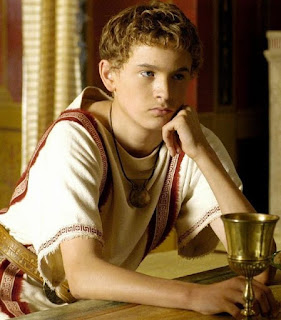However, it hasn't always been the case that 1 January was New Year's Day. For a very long time the New Year began in March. This actually isn't such a strange concept. The Chinese have their New Year's celebrations in February. Jewish New Year is in September.
A Year Has No Obvious Beginning
A year simply measures the length of time the Earth takes to do a complete rotation of the Sun: no one can say "this is the day it started", so there's no reason to choose January over any other time. In many ways New Year in March makes more sense: it's when Spring arrives and is the beginning of the natural year.
 |
| A year doesn't actually begin on ANY particular day |
Here Come the Christians!
Now enter the Christians. 1 January has absolutely no religious connotations for the Church. 25 December does - it is the somewhat randomly selected date for Christ's birthday. Yes, random: the Bible gives us no clue as to when Christ was born except to mention that the shepherds were tending their flocks. They almost certainly wouldn't have been out in winter doing so.
Sir Isaac Newton argued that the early Christians simply took over a pagan ceremony connected to the winter solstice, and that seems still to be the predominant theory. Most Christians say this doesn't matter: the point is to celebrate the coming to the world of Jesus.
The Christians didn't start New Year at Christ's birth though: they counted back a pregnancy of 9 months (Swiss-Judean precision!) to Lady Day: 25 March. This is Annunciation Day: when Mary received the Holy Spirit and became pregnant with Jesus. So there we have it. New Year in the Christian Calendar became 25 March.
Mildly Confusing
That's kinda mildly confusing though. We're used to the New Year starting nice and neatly at the start of a new month (e.g on 1 January). For centuries however the calendar went like this:
22 March 1499
23 March 1499
24 March 1499 (New Year's Eve)
25 March 1500 (New Year's Day)
26 March 1500
27 March 1500 etc.
There's a neat little example of the old Christian calendar in action in Salisbury Cathedral. Look hard and you'll find a tiny grave of a boy. In modern English his stone reads as follows: Here lies the Body of Thomas, Son of Thomas Lambert, Gentleman... Born May 13 1683, died February 9 of the same year.
 |
| (Many thanks to @murphy_maria for the pic) |
See how that is possible? Good. Poor little baby Thomas died in February of 1683 just short of nine months old, because New Year's Day 1684 didn't arrive until 25 March.
The Romans Made a Mistake
Still with me? Smashing. Now it gets a bit more confusing still. The Romans had introduced the calendar with 12 months in BC45 under Caesar. It is named the Julian Calendar (presumably because he had a favourite budgie called Julie. Or something). Anyway, the Romans were a clever bunch, but they made a tiny mistake in working out they the length of the solar year. That tiny error led to a big mistake over the centuries.
 |
| I think he might have noticed. Silly Romans. |
By 1582 the calendar was "out" to the tune of 10 days. The shortest day in the calendar should be 21 December (the Winter Solstice); the longest day should be 21 June (Summer Solstice). However, because of the Romans' mistake the shortest day was now falling on 11 December. The days were already getting noticeably longer by 21 December. Pope Gregory XIII twigged and announced that the calendar should jump forward 10 days. They also did something technical to Leap Years to stop the error from occurring again*. Lovely job.
Now had naughty Martin Luther not started all that Reformation Jazz this could have been perfect. By 1582, however, the Pope's authority had been seriously challenged within Europe. The Northern Protestant nations viewed the new "Gregorian" calendar with a great deal of suspicion. Many ignored it - which led to horrible confusion in terms of determining on what date anything happened. The Eastern Orthodox Church also ignored it.
New Year's Day Moves Back to January
Although Pope Gregory did not expressly specify it, around the same time as the introduction of the new Gregorian calendar with its 10 day adjustment, many Catholic nations also moved New Year's Day from 25 March back to the Roman start of the year: 1 January. What's more, some Protestant Nations also did the same - but kept the Julian Calendar itself.
 |
| Bit of a nightmare: European Calendars around 1600 |
Shite, this is getting horribly complicated. Here's an example:
The Winter Solstice falls on 11 December 1599 in Scotland. Why? Because they're using the old Julian Calendar**. However, the still independent kingdom decides at this time to move New Year's Day away from 25 March and back to 1 January. The year 1600 therefore arrives in Scotland on 1 January. The same day, 1 January, is however still labelled 1599 in neighbouring England. New Year's Eve in England will be on 24 March and 1600 will not arrive until 25 March....
Let's hop on a hovercraft and go on a booze cruise to Calais. The Catholic French have adopted the Gregorian Calendar in full, as well as the move of New Year's Day to 1 January. Therefore if we make this trip on say the Spring Equinox, the exact same day is labelled in the following way:
- 11 March 1600 in Scotland (Julian Calendar with New Year on 1 January)
- 11 March 1599 in England (Julian Calendar with New Year on 25 March)
- 21 March 1600 in France (Gregorian Calendar with New Year on 1 January)
It is literally a nightmare... And *now* who is complaining about EU standardisation, eh?
Riots on the Streets
The British Empire, of course, is (almost) the last of the lot to move to the new accurate Gregorian Calendar and (with the exception of Scotland) is ever conservative about leaving New Year on 25 March. Finally in 1752 Parliament makes the switch to both. By this time the error in the old Julian calendar was so great, instead of ten, a full eleven days had to be skipped.
Wednesday 2 September 1752 was followed by Thursday 14 September 1752. People felt their lives had been shortened by 11 days as a result of an Act of Parliament. There are literally riots on the streets.
 |
| The blackboard is centre front |
It was still an election issue three years later in 1755. This Hogarth painting has a tiny blackboard in the front. When magnified the words read "Give us our 11 days". The change of calendar incidentally affected the whole of the British Empire, including the United States, which had not yet become revolting ;-)
Well, finally we're all there. Except the Eastern Orthodox Church, that is. Russia waits until the Bolshevik revolution of 1917 to move to the Gregorian calendar; the Greeks wait until 1923 and the Russian Orthodox Church is (somewhat unbelievably) still on the faulty Julian Calendar. This explains why their Christmas is celebrated so much later than ours. They are now a full 13 days slow, so for them 25 December falls on the day we now label 7 January. Don't make the mistake of thinking they celebrate Christ's birth on a different date: for them it *is* 25 December. They've just not got yet changed to the more accurate calendar.
The Tax Year: 5 April
Okay have you died yet? Nope? Then you need to know about this curious remnant of the Julian Calendar and New Year's falling on 25 March. When does the tax year in the UK begin? "6 April" you answer. Yes: and why? Well if you take 25 March as the old New Years day... and add on the eleven days' adjustment that were required in 1752 you end up with..... 6 April***. Ka-Boom.
It was felt that it was unfair on the Exchequer to shorten their tax revenue by 11 days when the calendar changed, so the tax year was left as it was, with the exception of the eleven day adjustment.
Her Majesty's Customs and Revenue are therefore still organising our tax years around the date the Virgin Mary became pregnant, with an adjustment for the miscalculation made by Julius Caesar. This is another example of a "New Year" starting mid-month of course. 5 April 2012 is in Tax Year 2011/12, while 6 April 2012 falls in the "New" Tax Year 2012/13.
Numbering the Months
There's one last curiosity to note. If we go all the way back to the ancient Calendar of Romulus, which was before 1 January was chosen as New Year's Day in BC153, and before the introduction of the Julian Calendar in BC45, you'll probably remember that we find March as the first month of the year.
 |
| Mars: God of War |
March was named after Mars who was God of War and was second only to Jupiter in the Roman Godly hierarchy. Like March the months of April, May, June all had proper names. Then the Ancient Romans ran out of ideas. Accordingly:
- July was Quintilis (fifth month)
- August was Sextilis (sixth month)
- September was September (seven month)
I like it, though, and it is a reminder of where we began: New Year's Day is on 1 January, but originally, and for a very long time, New Year began in March. For HMRC it still kinda does.
Now have a drink and HAPPY NEW YEAR!
* Every year that is exactly divisible by four was to remain a leap year, except for years that are exactly divisible by 100; the centurial years that are exactly divisible by 400 would remain leap years. For example, the year 1900 is not a leap year (it is divisible by 100 but not 400); the year 2000 is a leap year (divisible by 400). You can see why I kept this as a foot note.
** There is a popular misconception that the Scots adopted the Gregorian Calendar in full on 1 January 1600. They remained on the Julian Calendar until 1752 along with the rest of the British Empire. All they did was move New Years Day to 1 January from 1600.
*** God, this is so technical. Add 11 days to 25 March and you have 5 April. The reason that the Tax Year begins 6 April is because 1800 is a centurial year that would have been a Leap Year under the Julian Calendar, but not under the Gregorian Calendar (it's not divisible by 400). The Exchequer went with the Julian rule, so it's therefore 12 days that are now added to 25 March to reach the Tax New Year. Right, I need a triple vodka.




























